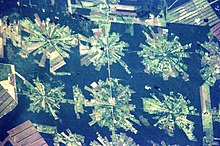

Nature conservation is the moral philosophy and conservation movement focused on protecting species from extinction, maintaining and restoring habitats, enhancing ecosystem services, and protecting biological diversity. A range of values underlie conservation, which can be guided by biocentrism, anthropocentrism, ecocentrism, and sentientism,[1] environmental ideologies that inform ecocultural practices and identities.[2] There has recently been a movement towards evidence-based conservation which calls for greater use of scientific evidence to improve the effectiveness of conservation efforts. As of 2018 15% of land and 7.3% of the oceans were protected. Many environmentalists set a target of protecting 30% of land and marine territory by 2030.[3][4] In 2021, 16.64% of land and 7.9% of the oceans were protected.[5][6] The 2022 IPCC report on climate impacts and adaptation, underlines the need to conserve 30% to 50% of the Earth's land, freshwater and ocean areas – echoing the 30% goal of the U.N.'s Convention on Biodiversity.[7][8]
- ^ Newman, Varner, Lunquist (2018). Defending Biodiversity. Cambridge University Press. ISBN 9781139024105.
{{cite book}}: CS1 maint: multiple names: authors list (link) - ^ Milstein, T. & Castro-Sotomayor, J. (2020). Routledge Handbook of Ecocultural Identity. London, UK: Routledge. https://doi.org/10.4324/9781351068840
- ^ MARRIS, EMMA (31 January 2019). "To keep the planet flourishing, 30% of Earth needs protection by 2030". National Geographic. Archived from the original on 3 March 2021. Retrieved 18 May 2021.
- ^ "New Australian Marine Parks Protect an Area Twice the Size of the Great Barrier Reef". Mongabay. Ecowatch. 14 May 2021. Retrieved 18 May 2021.
- ^ "Governments achieve target of protecting 17% of land globally". the Guardian. 19 May 2021. Retrieved 22 April 2022.
- ^ "2021's top ocean news stories (commentary)". Mongabay Environmental News. 28 December 2021. Retrieved 22 April 2022.
- ^ Januta, Andrea (1 March 2022). "Key takeaways from the IPCC report on climate impacts and adaptation". World Economic Forum. Retrieved 2 March 2022.
- ^ "Negotiators agree to historic biodiversity deal at COP15". euronews. 19 December 2022. Retrieved 19 December 2022.